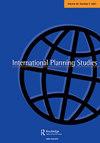埃塞俄比亚亚的斯亚贝巴过度城市化的驱动因素和前景
IF 1.5
Q4 REGIONAL & URBAN PLANNING
引用次数: 0
摘要
过度城市化似乎是发展中国家城市的显著特征之一,因为人口增长超过了经济发展。这项研究是非洲首批研究过度城市化的主要驱动因素和前景的研究之一。利用叶芝和多元回归模型确定了城市的土地支持能力(LSC)、社会容纳能力和拥挤程度。指导本研究的理论框架是现代化理论和依赖理论。研究结果表明,亚的斯亚贝巴的过度城市化是由于人口增长、内部移民、经济结构薄弱和政策失败造成的。LSC为0.017,说明该市过于拥挤,即人口超过了LSC。回归模型表明,家庭规模和收入与拥挤程度有显著的关系。有效的城市发展政策是平衡人口增长和经济发展的必要条件。这可以通过控制亚的斯亚贝巴的第一比率和将政府投资引向二线城镇和农村地区来实现。本文章由计算机程序翻译,如有差异,请以英文原文为准。
Drivers and prospects of over-urbanization of Addis Ababa, Ethiopia
ABSTRACT Over-urbanization appears to be one of the distinctive traits of cities of developing countries because population growth surpasses economic development. This study is among the first research in Africa to examine the major drivers and prospects of over-urbanization. We determined the city's Land Support Capacity (LSC), social accommodation capacity, and crowdness using Yeats and Multiple Regression Models. The theoretical frameworks that guide this study are modernization and dependency theories. Findings showed that Addis Ababa is over-urbanized due to population growth, internal migration, weak economic structure, and policy failure. With an LSC of 0.017, the city is overcrowded, i.e. the population outnumbers the LSC. The regression model showed that household size and income had a significant relationship with crowdness. Effective urban development policies are necessary to balance population growth and economic development. This might be accomplished by curbing Addis Ababa's primacy rate and directing governmental investment toward secondary towns and rural areas.
求助全文
通过发布文献求助,成功后即可免费获取论文全文。
去求助
来源期刊

International Planning Studies
REGIONAL & URBAN PLANNING-
CiteScore
4.60
自引率
4.80%
发文量
20
期刊介绍:
Planning, at urban, regional, national and international levels, faces new challenges, notably those related to the growth of globalisation as both an objective socio-economic process and a shift in policy-maker perceptions and modes of analysis. International Planning Studies (IPS) addresses these issues by publishing quality research in a variety of specific fields and from a range of theoretical and normative perspectives, which helps improve understanding of the actual and potential role of planning and planners in this context.
 求助内容:
求助内容: 应助结果提醒方式:
应助结果提醒方式:


